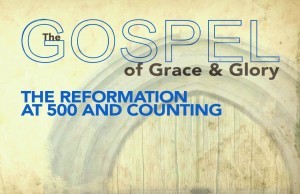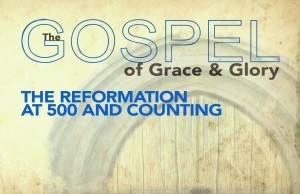Kevin DeYoung's Blog, page 20
October 24, 2017
The Stupidity of Sin
 The Puritans use to speak of the exceeding sinfulness of sin. And they were right to do so. Sin is a heinous insult to a holy God. It is lawless, treasonous, rebellion.
The Puritans use to speak of the exceeding sinfulness of sin. And they were right to do so. Sin is a heinous insult to a holy God. It is lawless, treasonous, rebellion.
It’s also really dumb.
Everyone who knows the Bible, knows people, or knows his own heart, knows this to be true: sin makes us stupid.
Think of the Garden of Eden. You literally live in paradise, and you listen to a snake whisper something about a tasty fruit. Why risk it?
Or David and Bathsheba. You are the king for crying out loud. You have everything. You’ve seen the Lord bless your socks off since you were a boy. And you send for a pretty bathing girl? And then try to cover your tracks with one boneheaded sin after another?
The prodigal son is another classic example. He could have had fine food, familial warmth, and a roof over his head. But he got greedy, blew threw a wad of cash, and ended up with the pigs.
Or what about the thief on the cross (the bad one) who can’t think of anything better to do with his final breaths than to mock another dying “criminal”?
And then there’s Ananias and Sapphira who get themselves killed over a silly lie about how much they got for their property. What a waste.
Sin makes us stupid.
When we are thinking rationally, we can see the insanity of sin. Why would anyone throw away a livelihood, a family, or a reputation for a 30 minute roll in the hay? What good will it do to seek revenge, and feel satisfied for an afternoon, if it means reaping a whirlwind of consequences for decades? Why would we keep drinking, telling ourselves it’s only in moderation, if we know a thousand bad things can happen if we fall off the wagon again? Why would we flirt with a married man? Why follow the woman up to her room? Why flip through those channels in the hotel room?
Sadly, we’ve all seen it before. From friends and family. Maybe from a trusted pastor or ministry colleague. It’s easier to see in others–the defensiveness, the blame-shifting, the excuse making, the nonsense of exchanging decades of faithfulness for minutes of folly. But what’s clear when looking at others can be hard to spot in ourselves. Just like the proverbial piece of lettuce on the lips, we can be last to realize how stupid we’ve become because of sin.
We may sin in serenity for a season. But God cannot be mocked forever (Gal. 6:7). Our madness will be made manifest. Eventually, his words will overtake us (Zech. 1:6).
So repent, says the prophet (Zech 1:6). Let us turn from temptation before it is too late. Let’s all of us–myself included–hide the word in our hearts, or better still, tell a friend, “Please tell me when I’m being stupid, and if I don’t believe you then, remind me that I believe you now.”
And if we ever do find ourselves sitting among the swine, let’s remember that the Father is ready for us to come home. With open arms, a warm embrace, and a top notch party.
When we come to our senses and put aside the stupidity of sin.
October 17, 2017
Two Indispensable Requirements for Pastoral Ministry
There are a number of things I could list in a blog post with this title. I don’t want to suggest that the two requirements I’m about to mention are the only two requirements. Surely, there are many other things we can and should say about effective pastoral ministry. But in my experience, ministry won’t go well, and pastors won’t go far, without at least these two requirements:
We must like studying the Bible.
And we must like our people.
The word “like” may feel a bit squishy, but I use it intentionally. We all know that we should love the Word of God and love people. That’s a given. But if that’s all I said, we’d nod together in tedious agreement: “Yes, good reminder, Kevin. The Bible is important, and the church is important. We must be people of the book and shepherds after God’s own heart.”
True, true. But with “like” I’m trying to say something a little different than all that.
I mean we should enjoy learning, enjoy discovery, and (in places where literacy and resources are plentiful) enjoy reading books. Young men need to realize that preaching and teaching is not all pastors do in ministry, not by a long shot. But they also need to realize that with all the preaching and teaching they are going to do in a lifetime of ministry, they better like studying, or they won’t have anything true and interesting to say.
I’m sure there are terrible preachers who got A’s in school and amazing preachers who got C’s. The best graduate students don’t always make the best pastors. But over the long haul, the best preachers—the kind who faithfully feed the same flock Sunday after Sunday for decades—will be the best students of the Bible. You need more than a formal love for God’s Word. You need to really like staring at the Bible and reading about the Bible and seeing and sharing new things from the Bible.
By the same token, we must genuinely like the people with whom we serve and to whom we preach. Of course, we must love the congregation. But we ought to really like the congregation too. We should naturally smile when we see our people (most of our people anyway). We should enjoy hearing their stories. We should be happy to meet their children and parents and grandparents. When we think about the members in our church, we should have that undefinable and unmistakable feeling in our gut that says, “I like them.”
Over the years I’ve had the opportunity to invite a number of pastor friends to come and guest preach in my church. Some of these friends are well known. I always get excited to have them in the pulpit, not because I get to show off my friend to the church, but because I get to show off the church to my friend. I want my pastor friends to meet that hard-working elder and that faithful homeschooling mom and that widow who always gives me a hug and that college student with the great questions and that little girl who draws funny pictures of me while I’m preaching.
I bet most of the pastors reading this blog like their studies. That’s wonderful. They should like their people too. People can tell if they are projects or platforms or nothing more than “ministry.” Of course, pastors won’t feel a special bond with everyone, and in bigger churches there will be people in our congregations we don’t know personally. But the norm should be that we look out at the people on Sunday and think, I really like her and him and them. Everywhere I look there are people I’m glad to know and happy to be with.
The people who do their jobs best usually like their jobs most. And we like following people who like what they do. I’ve often wondered if the missing ingredient in many churches is simply an awareness by the congregation that the pastor is really happy to be their pastor—happy to be in the Word each week and happy to be in their lives.
We can’t ignore the call to love. That’s all over the Bible. But we won’t get very far, and neither will our people, if we don’t show a little like too.
The post Two Indispensable Requirements for Pastoral Ministry appeared first on The Gospel Coalition.
October 16, 2017
Two Indispensable Requirements for Pastoral Ministry
 There are a number of things I could list in a blog post with this title. I don’t want to suggest that the two requirements I’m about to mention are the only two requirements. Surely, there are many other things we can and should say about effective pastoral ministry. But in my experience, ministry won’t go well, and pastors won’t go far, without at least these two requirements:
There are a number of things I could list in a blog post with this title. I don’t want to suggest that the two requirements I’m about to mention are the only two requirements. Surely, there are many other things we can and should say about effective pastoral ministry. But in my experience, ministry won’t go well, and pastors won’t go far, without at least these two requirements:
We must like studying the Bible.
And we must like our people.
The word “like” may feel a bit squishy, but I use it intentionally. We all know that we should love the word of God and love people. That’s a given. But if that’s all I said, we’d nod together in tedious agreement: “Yes, good reminder, Kevin. The Bible is important, and the church is important. We must be people of the book and shepherds after God’s own heart.”
True, true. But with “like” I’m trying to say something a little different than all that.
I mean we should enjoy learning, enjoy discovery, and (in places where literacy and resources are plentiful) enjoy reading books. Young men need to realize that preaching and teaching is not all pastors do in ministry, not by a long shot. But they also need to realize that with all the preaching and teaching they are going to do in a lifetime of ministry, they better like studying or they won’t have anything true and interesting to say.
I’m sure there are terrible preachers who got A’s in school and amazing preachers who got C’s. The best graduate students don’t always make the best pastors. But over the long haul, the best preachers—the kind that faithfully feed the same flock Sunday after Sunday for decades—will be the best students of the Bible. You need more than a formal love for God’s word. You need to really like staring at the Bible and reading about the Bible and seeing and sharing new things from the Bible.
By the same token, we must genuinely like the people with whom we serve and to whom we preach. Of course, we must love the congregation. But we ought to really like the congregation too. We should naturally smile when we see our people (most of our people anyway). We should enjoy hearing their stories. We should be happy to meet their children and parents and grandparents. When we think about the members in our church, we should have that undefinable and unmistakable feeling in our gut that says, “I like them.”
Over the years I’ve had the opportunity to invite a number of pastor friends to come and guest preach in my church. Some of these friends are well known. I always get excited to have them in the pulpit, not because I get to show off my friend to the church, but because I get to show off the church to my friend. I want my pastor friends to meet that hard working elder and that faithful homeschooling mom and that widow who always gives me a hug and that college student with the great questions and that little girl who draws funny pictures of me while I’m preaching.
I bet most of the pastors reading this blog like their studies. That’s wonderful. They should like their people too. People can tell if they are projects or platforms or nothing more than “ministry.” Of course, pastors won’t feel a special bond with everyone, and in bigger churches there will be people in our congregations we don’t know personally. But the norm should be that we look out at the people on Sunday and think, “I really like her and him and them. Everywhere I look there are people I’m glad to know and happy to be with.”
The people who do their jobs best usually like their jobs most. And we like following people who like what they do. I’ve often wondered if the missing ingredient in many churches is simply an awareness by the congregation that the pastor is really happy to be their pastor—happy to be in the word each week and happy to be in their lives.
We can’t ignore the call to love. That’s all over the Bible. But we won’t get very, and neither will our people, if we don’t show a little like too.
October 12, 2017
Reformation Conference October 27-28, 2017
 The conference kicks off two weeks from tomorrow!
The conference kicks off two weeks from tomorrow!
Join us in celebrating the 500th anniversary of the Protestant Reformation on October 27-28 at Christ Covenant Church in Matthews, North Carolina. The conference, entitled “The Gospel of Grace & Glory: The Reformation at 500 and Counting,” is sponsored by Christ Covenant Church and Reformed Theological Seminary.
Mike Kruger will lead the conference off by speaking on Friday evening at 7:00pm on Sola Scriptura. I will speak that same evening at 8:30pm on Sola Fide. We will hear from Keith Getty (Soli Deo Gloria), James Anderson (Sola Gratia) and Blair Smith (Solus Christus) on Saturday. There are also breakout sessions on Saturday morning with Bill Barcley (on worship), Don Fortson (on William Tyndale) and Brian Peterson (on the church).
The conference is $25/person ($50/family) with financial assistance available. More information, including how to register, is available here.
Although the conference is technically only Friday and Saturday, we also have special events planned (for free) on Sunday, October 29. I will be teaching a combined Sunday school class on “Ad Fontes: The Reformation Slogan We Never Hear About.” Mike Kruger will lead our morning worship service at 10:45am, preaching from Matthew 21:28-32. We will end the weekend with a 7:00pm concert featuring Keith and Kristyn Getty. No tickets are required, but an offering will be taken to defray the cost of the event.
If you are anywhere near Charlotte at the end of October, we hope that you will consider joining us for this special Reformation weekend.
The post Reformation Conference October 27-28, 2017 appeared first on The Gospel Coalition.
October 11, 2017
Reformation Conference October 27-28, 2017
 The conference kicks off two weeks from tomorrow!
The conference kicks off two weeks from tomorrow!
Join us in celebrating the 500th anniversary of the Protestant Reformation on October 27-28 at Christ Covenant Church in Matthews, North Carolina. The conference, entitled "The Gospel of Grace & Glory: The Reformation at 500 and Counting,” is sponsored by Christ Covenant Church and Reformed Theological Seminary.
Mike Kruger will lead the conference off by speaking on Friday evening at 7:00pm on Sola Scriptura. I will speak that same evening at 8:30pm on Sola Fide. We will hear from Keith Getty (Soli Deo Gloria), James Anderson (Sola Gratia) and Blair Smith (Solus Christus) on Saturday. There are also breakout sessions on Saturday morning with Bill Barcley (on worship), Don Fortson (on William Tyndale) and Brian Peterson (on the church).
The conference is $25/person ($50/family) with financial assistance available. More information, including how to register, is available here.
Although the conference is technically only Friday and Saturday, we also have special events planned (for free) on Sunday, October 29. I will be teaching a combined Sunday school class on "Ad Fontes: The Reformation Slogan We Never Hear About." Mike Kruger will lead our morning worship service at 10:45am, preaching from Matthew 21:28-32. We will end the weekend with a 7:00pm concert featuring Keith and Kristyn Getty. No tickets are required, but an offering will be taken to defray the cost of the event.
If you are anywhere near Charlotte at the end of October, we hope that you will consider joining us for this special Reformation weekend.
October 9, 2017
Monday Morning Humor
We recently bought a refrigerator. It keeps our food cold for a thousand bucks.
The post Monday Morning Humor appeared first on The Gospel Coalition.
October 8, 2017
Monday Morning Humor
We recently bought a refrigerator. It keeps our food cold for a thousand bucks.
October 3, 2017
A Romans Response to Tragedy
O gracious God, we can see your presence and your power at work in the world (Rom. 1:7, 20), but often the truth seems submerged under so many lies (Rom. 1:23). We like to think our world is safe and good and peaceful, but we know there is all manner of unrighteousness, evil, and malice (Rom. 1:29). We renounce all that is foolish, faithless, heartless, and ruthless (Rom. 1:31), and confess that the same spirit of rebellion can pulse through our veins (Rom. 2:1).
You are a righteous Judge, storing up judgment for the impenitent (Rom. 2:5). Pour out your wrath and fury upon the godless, and in your kindness lead us to repentance that we might not be numbered among them (Rom. 2:4-8). Speak to the consciences of your creatures that we may run from what is wrong and turn to what is right (Rom. 2:14-16).
Sovereign Lord, may the unrighteousness of man serve to show the world your righteousness (Rom. 3:5). Apart from you, we are not merely broken and wounded, but worthless and wicked (Rom. 3:12). We see the feet of those who are swift to shed blood and shudder to think of the ruin and misery they leave in their paths (Rom. 3:15-16). It is true of killers, shooters, and terrorists—just as it was once true of of us—there is no fear of God before their eyes (Rom. 3:18).
Have mercy, O God, for all have sinned and fall short of the glory of God (Rom. 3:23). Justify us by the grace that is ours in Christ Jesus (Rom. 3:24). Forgive our lawless deeds (Rom. 4:7). May grace reign in us through the righteousness that leads to eternal life through Jesus Christ our Lord (Rom. 5:21). Crucify our sinful desires (Rom. 6:6). Set us free from the things to lead to death (Rom. 6:21). Make us slaves to ever-increasing righteousness (Rom. 6:18, 19, 22). Deliver us, O Lord, from these bodies of death (Rom. 7:24).
We know that we are not yet what we will be; oh how eagerly we long for the revealing of your glory in us (Rom. 8:18-19). In the midst of so much death, disease, and destruction, we join with all creation in groaning for freedom, in crying out for relief from the bondage to decay (Rom. 8:20-23). We want to hope, but hope is hard, so give us patience to wait for what we cannot see (Rom. 8:24-25).
Grant us your Spirit—an aid in weakness and an intercessor to pray when we don’t know what to speak (Rom. 8:26-27). We know that all things work together for good, for those who are called according to your purpose (Rom. 8:28). So keep those you call and bring safely home all all your children still on the journey (Rom. 8:29-30).
Many people are hurting. So many struggle. And so many things can seem against us. But if you are for us, that is more than enough (Rom. 8:31). If you gave up your Son, we can trust you to take up our cause (Rom. 8:32). No matter the trial and no matter the trouble, we know Jesus is praying for us, Jesus is with us, and Jesus will never leave us nor forsake us (Rom. 8:34-39).
We praise you, O God, for your never-failing, never-faltering, never-giving-up-on-us love (Rom. 8:37-39).
The post A Romans Response to Tragedy appeared first on The Gospel Coalition.
October 2, 2017
A Romans Response to Tragedy
 O gracious God, we can see your presence and your power at work in the world (Rom. 1:7, 20), but often the truth seems submerged under so many lies (Rom. 1:23). We like to think our world is safe and good and peaceful, but we know there is all manner of unrighteousness, evil, and malice (Rom. 1:29). We renounce all that is foolish, faithless, heartless, and ruthless (Rom. 1:31), and confess that the same spirit of rebellion can pulse through our veins (Rom. 2:1).
O gracious God, we can see your presence and your power at work in the world (Rom. 1:7, 20), but often the truth seems submerged under so many lies (Rom. 1:23). We like to think our world is safe and good and peaceful, but we know there is all manner of unrighteousness, evil, and malice (Rom. 1:29). We renounce all that is foolish, faithless, heartless, and ruthless (Rom. 1:31), and confess that the same spirit of rebellion can pulse through our veins (Rom. 2:1).
You are a righteous Judge, storing up judgment for the impenitent (Rom. 2:5). Pour out your wrath and fury upon the godless, and in your kindness lead us to repentance that we might not be numbered among them (Rom. 2:4-8). Speak to the consciences of your creatures that we may run from what is wrong and turn to what is right (Rom. 2:14-16).
Sovereign Lord, may the unrighteousness of man serve to show the world your righteousness (Rom. 3:5). Apart from you, we are not merely broken and wounded, but worthless and wicked (Rom. 3:12). We see the feet of those who are swift to shed blood and shudder to think of the ruin and misery they leave in their paths (Rom. 3:15-16). It is true of killers, shooters, and terrorists—just as it was once true of of us—there is no fear of God before their eyes (Rom. 3:18).
Have mercy, O God, for all have sinned and fall short of the glory of God (Rom. 3:23). Justify us by the grace that is ours in Christ Jesus (Rom. 3:24). Forgive our lawless deeds (Rom. 4:7). May grace reign in us through the righteousness that leads to eternal life through Jesus Christ our Lord (Rom. 5:21). Crucify our sinful desires (Rom. 6:6). Set us free from the things to lead to death (Rom. 6:21). Make us slaves to ever increasing righteousness (Rom. 6:18, 19, 22). Deliver us, O Lord, from these bodies of death (Rom. 7:24).
We know that we are not yet what we will be; oh how eagerly we long for the revealing of your glory in us (Rom. 8:18-19). In the midst of so much death, disease, and destruction, we join with all creation in groaning for freedom, in crying out for relief from the bondage to decay (Rom. 8:20-23). We want to hope, but we hope is hard, so give us patience to wait for what we cannot see (Rom. 8:24-25).
Grant us your Spirit—an aid in weakness and an intercessor to pray when we don’t know what to speak (Rom. 8:26-27). We know that all things work together for good, for those who are called according to your purpose (Rom. 8:28). So keep those you call and bring safely home all all your children still on the journey (Rom. 8:29-30).
Many people are hurting. So many struggle. And so many things can seem against us. But if you are for us, that is more than enough (Rom. 8:31). If you gave up your Son, we can trust you to take up our cause (Rom. 8:32). No matter the trial and no matter the trouble, we know Jesus is praying for us, Jesus is with us, and Jesus will never leave us nor forsake us (Rom. 8:34-39).
We praise you, O God, for your never failing, never faltering, never giving up on us love (Rom. 8:37-39).
September 25, 2017
Seven Characteristics of Liberal Theology
What is theological liberalism?
Liberalism is both a tradition—coming out of the late-18th century Protestant attempt to reconfigure traditional Christian teaching in the light of modern knowledge and values—and a diverse, but recognizable approach to theology.
Like any “ism,” liberalism is not easy to pigeonhole. But Gary Dorrien’s magisterial three volumes on The Making of American Liberal Theology present a coherent picture of a movement that has been marked by identifiable hermeneutical and sociological commitments. Even if one wishes to avoid liberal theology, it would still be wise to know something about a movement that has exerted such considerable influence over the past 200 years.
Below are seven characteristics of liberalism that have been culled from the first volume of Dorrien’s trilogy. The headings are mine; the indented text is from the book.
1. True religion is not based on external authority
The idea of liberal theology is nearly three centuries old. In essence, it is the idea that Christian theology can be genuinely Christian without being based upon external authority. Since the eighteenth century, liberal Christian thinkers have argued that religion should be modern and progressive and that the meaning of Christianity should be interpreted from the standpoint of modern knowledge and experience. (xii)
What’s more, Dorrien recognizes this rejection is something new in the history of the church.
Before the modern period, all Christian theologies were constructed within a house of authority. All premodern Christian theologies made claims to authority-based orthodoxy. Even the mystical and mythopoetic theologies produced by premodern Christianity took for granted the view of scripture as an infallible revelation and the view of theology as an explication of propositional revelation. Adopting the scholastic methods of their Catholic adversaries, Protestant theologians formalized these assumptions with scholastic precision during the seventeenth century. Not coincidentally, the age of religious wars that preceded the Enlightenment is also remembered as the age of orthodoxy.
Reformed and Lutheran orthodoxy heightened the Reformation principle that scripture is the sole and infallibly sufficient rule of faith, teaching that scripture is also strictly inerrant in all that it asserts. (xv)
Note that Dorrien does not believe inerrancy was a Princetonian invention.
2. Christianity is a movement of social reconstruction.
One of the most influential definitions of theological liberalism was offered in 1949 by an able latter-day proponent, Daniel Day Williams: “By ‘liberal theology’ I mean the movement in modern Protestantism which during the nineteenth century tried to bring Christian thought into organic unity with the evolutionary world view, the movements from social reconstruction, and the expectations of ‘a better world’ which dominated the general mind. It is that form of Christian faith in which a prophetic-progressive philosophy of history culminates in the expectation of the coming of the Kingdom of God on earth.” (xiv)
3. Christianity must be credible and relevant.
Specifically, liberal theology is defined by its openness to the verdicts of modern intellectual inquiry, especially the nature and social sciences; its commitment to the authority of individual reason and experience; its conception of Christianity as an ethical way of life; its favoring of moral concepts of atonement; and its commitment to make Christianity credible and socially relevant to modern people. (xxiii)
4. Truth can be know only through changing symbols and forms.
Bushnell admonished that “all our difficulties and controversies” regarding the truths of revelation were caused by a basic failure to face up to what was known about the clothing of truths in signs and analogies. The problem was not peculiar to New England theology, he suggested; it was an “almost universal sin that infests the reasonings of mankind concerning moral and spiritual subjects.” Throughout the world, people treated the symbolic forms of their truths as the truths themselves. (151)
5. Theological controversy is about language, not about truth.
Bushnell debated various doctrinal points with his adversaries, claiming always that their disagreements were about language usage, not lack of belief: “All my supposed heresies, in reference to these great subjects, are caused by the arrest of speculation and the disallowance of those constructive judgments, or a priori arguments, by which terms that are only analogies, and mysteries that are most significant when taken only as symbols, are made to affirm something wiser and more exact than what they express." (151-52)
6. The historical accuracies of biblical facts and events are not crucial, so long as we meet Jesus in the pages of Scripture.
He cautioned that the faithful reader of scripture is not obliged to assume the truth of the Gospel narrative “by which the manner and facts of the life of Jesus are reported to us.” That was the matter in question, “We only assume the representations themselves, as being just what they are, and discover their necessary truth, in the transcendent, wondrously self-evident, picture of divine excellence and beauty exhibited in them.” Bushnell counseled that the biblical narrative is not very impressive aside from the extraordinary character of its pivotal figure, but the more that we study the figure of Jesus, “a picture shining in its own clear sunlight upon us,” the more clearly we are brought into the source and light of all truth: “Jesus, the Divine Word, coming out from God, to be incarnate with us, and be the vehicle of God and salvation to the race.” (399)
7. The true religion is the way of Christ, not any particular doctrines about Christ.
The Word of Christ is not a doctrine or the end of an argument, but a self-authenticating life; it is morally regenerative spiritual power claimed in Christ’s spirit. . . . Moving beyond their mentor, the Bushnellians accented the humanity of Christ; Munger and Gladden lifted Jesus’ teaching above any claims about his person. In both cases, however, a self-authenticating moral image conceived as the power of true religion was in control. The true religion is the way of Christ. (399-400)
Dorrien observes that this kind of religion was a departure from historic orthodoxy.
Traditional Protestant orthodoxies place the substitutionary atonement of Christ at the center of Christianity, conceiving Christ’s death as a propitiatory sacrifice that vicariously satisfied the retributive demands of divine justice. (400)
The new progressive religion of liberalism understood Christianity quite differently.
By the end of Beecher’s life, it was almost prosaic for Munger and Gladden to assert that Christianity is essentially a life, not a doctrine. (405)
Conclusion
Liberalism is not a swear word to be thrown around. It is a diverse, but identifiable approach to Christianity, one that differs significantly from historic orthodoxy, not to mention evangelicalism and fundamentalism.
Liberals believe they are making Christianity relevant, credible, beneficial, and humane. Evangelicals in the line of J. Gresham Machen believe they are making something other than Christianity. That was the dividing line a century ago, and the division persists.



